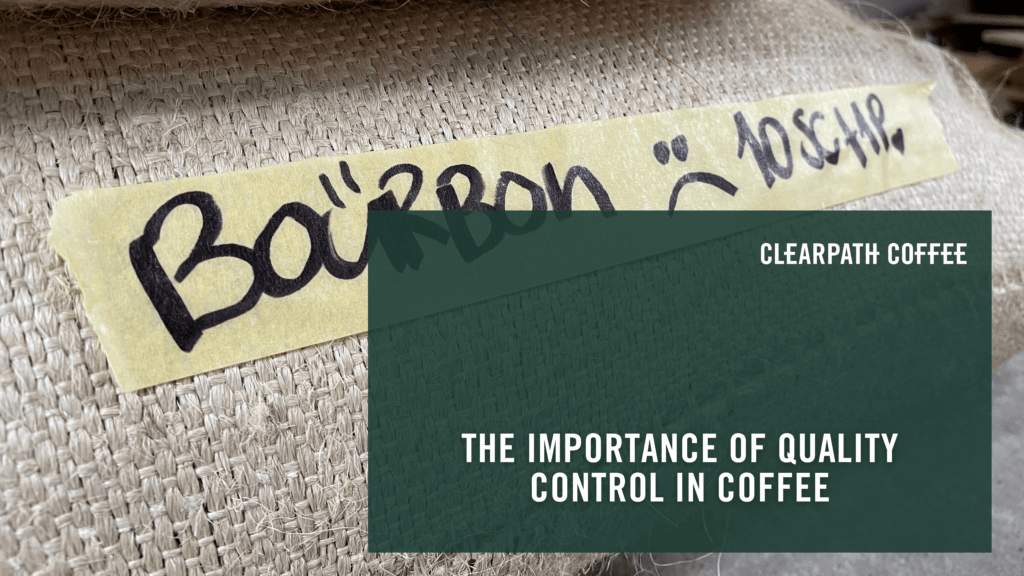In the world of specialty coffee, quality control is not just a step in the production process; it is the foundation that ensures the highest standards for Colombian specialty coffee. While much attention is given to the sensory attributes that make a coffee unique, an equally vital aspect is defect detection. This is where cupping, a skill that everyone in the coffee industry must master, becomes essential. At ClearPath Coffee, our commitment to rigorous quality control is a key part of what sets us apart in the market.
The Skill of Cupping: An Indispensable Tool at ClearPath Coffee
Cupping is far more than just a technical evaluation to determine the value or market placement of a coffee. It is a critical tool for identifying and correcting defects that may arise during production. At ClearPath Coffee, we have a dedicated quality control team made up of seven highly trained professionals, who work daily to ensure that every batch of coffee meets our high standards. This team plays a crucial role not only in identifying defects but also in ensuring that the entire process—from milling to sample shipments—is managed with precision.
Regular practice and continuous training are the backbone of this effort. Our cuppers stay up to date with the latest industry techniques to fine-tune their palates, which allows them to detect even the smallest imperfections. As the market for specialty green coffee evolves, so too must the skills of our team. This helps us not only identify standout qualities in our offerings but also catch potential issues early on.
Defects in Coffee: More Than Just Rejection, an Opportunity for Growth
Detecting defects isn’t merely about rejecting a batch. At ClearPath Coffee, we see it as an opportunity to improve and ensure that our customers always receive top-tier products. Every defect has a root cause, and being able to trace it—whether it’s a fermentation issue, drying problem, or storage mishap—enables us to take corrective action for future batches.
Our quality control team is equipped to identify whether a defect is process-related, environmental, or the result of handling. By maintaining this high level of scrutiny, we strengthen our relationships with customers who rely on the consistency and reliability of our Colombian specialty coffee.
Unique Challenges in Cupping: Co-Fermented Coffees and Varietals
One of the unique challenges we face at ClearPath Coffee is cupping co-fermented coffees. These coffees, which undergo unique fermentation processes involving additional carbohydrates and fruit flavors, present both an opportunity and a challenge. They require a deep understanding of the process to assess the final product effectively. Similarly, varietals like Gesha and Caturra Chiroso, known for their delicate and complex flavor profiles, are particularly challenging to roast and cup. However, our expertise and attention to detail ensure that we can unlock the full potential of these exceptional coffees.
These types of coffees are difficult to manage, but they offer immense rewards in terms of flavor and uniqueness, which makes them some of the most sought-after products in the specialty green coffee market. Our team’s ability to work with these intricate profiles demonstrates our deep commitment to pushing the boundaries of what coffee can offer.
Training in Defect Detection: Differences Between Origin and Consumer Markets
At origin, where Colombian specialty coffee is grown and processed, producers and cuppers have more exposure to defects and can often identify them more easily. In Colombia, our team is consistently calibrated to ensure precision in detecting defects, which provides a crucial advantage. However, for professionals working in consumer markets, like roasters and baristas, it can be more challenging to identify these issues at first glance.
Fortunately, the growing academic offerings in consumer markets provide opportunities to refine these skills. Many courses now focus on both the physical and sensory analysis of specialty green coffee, allowing industry professionals to sharpen their ability to detect defects and improve their knowledge of the coffee production process.
ClearPath Coffee’s Commitment to Quality Control
At ClearPath Coffee, we are committed to maintaining the highest standards in quality control. We understand that the journey of a coffee bean from farm to cup is filled with potential pitfalls, but our stringent processes ensure that only the best coffees make it to our customers. Our team of five cupping experts works daily to sample, assess, and approve each batch, ensuring that only the finest Colombian specialty coffee leaves our facilities.
Our in-house milling facility allows us to maintain control over every aspect of production. From ensuring that beans are processed to the correct physical standards to monitoring the precise conditions of storage and shipment, our team leaves no detail unchecked. This level of control allows us to manage both small and large volumes of coffee with the same level of care, guaranteeing consistency across all orders.
Conclusion: The Importance of Defects and Constant Improvement
Understanding coffee defects, their origins, and their specific flavors is crucial for any professional striving for excellence in the coffee industry. Early detection of defects not only prevents compromised batches from reaching the market but also offers a valuable opportunity for improvement and learning.
At ClearPath Coffee, we take pride in our role as a leader in Colombian specialty coffee. Our rigorous quality control processes, combined with our expertise in cupping complex varietals and co-fermented coffees, ensures that we consistently deliver top-quality products to our customers. This dedication to excellence is what allows us to maintain our position as a trusted partner in the global specialty green coffee market.
